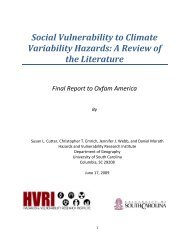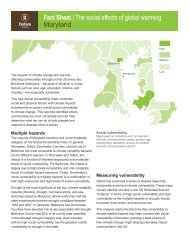Poverty Footprint Study on how the Coca Cola - Oxfam America
Poverty Footprint Study on how the Coca Cola - Oxfam America
Poverty Footprint Study on how the Coca Cola - Oxfam America
Create successful ePaper yourself
Turn your PDF publications into a flip-book with our unique Google optimized e-Paper software.
12<br />
Local envir<strong>on</strong>mental<br />
impacts: Focus <strong>on</strong><br />
water and recycling<br />
Headlines<br />
Growing sugar requires by far <strong>the</strong> most water of all of<br />
<strong>the</strong> activities carried out al<strong>on</strong>g <strong>the</strong> <strong>Coca</strong>-<strong>Cola</strong>/SABMiller<br />
value chain.<br />
Both of SABMiIIer’s bottling plants in Zambia and<br />
El Salvador are engaged in community dialogue<br />
<strong>on</strong> water use.<br />
Full treatment of wastewater by both SABMiller bottling<br />
plants has been well received by <strong>the</strong> community.<br />
SABMiIIer’s bottling plants in both countries are<br />
proactively seeking to spur local recycling industries,<br />
given <strong>the</strong> increasing role <strong>Coca</strong>-<strong>Cola</strong> product packages<br />
are potentially playing in <strong>the</strong> waste stream. Despite<br />
<strong>the</strong>se efforts, <strong>the</strong> recycling industry in both countries<br />
is limited or declining.<br />
64 Exploring <strong>the</strong> links between internati<strong>on</strong>al business and poverty reducti<strong>on</strong><br />
*This study did not c<strong>on</strong>duct an analysis of <strong>the</strong> impacts of chemical usage in sugar cane fields.<br />
Development, access to drinking water, sanitati<strong>on</strong><br />
and hygiene are all str<strong>on</strong>gly interc<strong>on</strong>nected. A lack<br />
of access to water can create c<strong>on</strong>flict am<strong>on</strong>g water<br />
users in a regi<strong>on</strong>, while a lack of basic sanitati<strong>on</strong><br />
can lead to illness and a poor quality of life in<br />
surrounding areas.*<br />
Businesses can have a serious impact <strong>on</strong> access<br />
and water quality based <strong>on</strong> <strong>the</strong>ir operati<strong>on</strong>s and<br />
supply chain. When businesses operate near local<br />
communities, <strong>the</strong>y can provide a vital service by<br />
offering access to a clean water supply and by fully<br />
treating <strong>the</strong>ir wastewater. Ultimately, businesses<br />
should take steps to ensure that <strong>the</strong>y are not<br />
infringing <strong>on</strong> <strong>the</strong> community’s access to or <strong>the</strong> quality<br />
of water in <strong>the</strong> short or l<strong>on</strong>g term. Both SABMiller and<br />
The <strong>Coca</strong>-<strong>Cola</strong> Company are members of <strong>the</strong> CEO<br />
Water Mandate, which includes a commitment by<br />
companies to streng<strong>the</strong>n water sustainability policies<br />
and practices.<br />
On July 28, 2010, <strong>the</strong> UN General Assembly adopted<br />
a resoluti<strong>on</strong>63 recognizing <strong>the</strong> human right to water,<br />
and calling <strong>on</strong> nati<strong>on</strong>s and internati<strong>on</strong>al organizati<strong>on</strong>s<br />
to provide financial resources, build capacity and<br />
transfer technology to developing countries to




